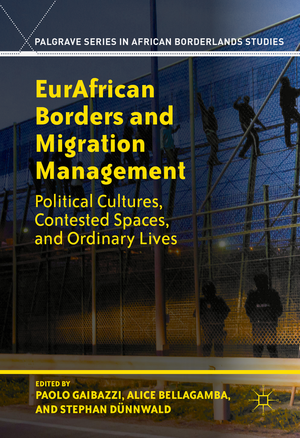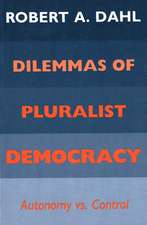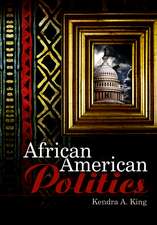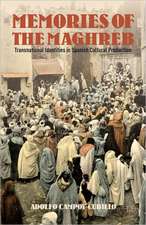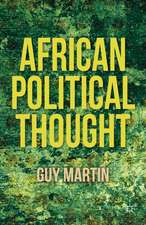EurAfrican Borders and Migration Management: Political Cultures, Contested Spaces, and Ordinary Lives: Palgrave Series in African Borderlands Studies
Editat de Paolo Gaibazzi, Stephan Dünnwald, Alice Bellagambaen Limba Engleză Hardback – 26 oct 2016
| Toate formatele și edițiile | Preț | Express |
|---|---|---|
| Paperback (1) | 1106.79 lei 6-8 săpt. | |
| Palgrave Macmillan US – 5 iul 2018 | 1106.79 lei 6-8 săpt. | |
| Hardback (1) | 1116.57 lei 6-8 săpt. | |
| Palgrave Macmillan US – 26 oct 2016 | 1116.57 lei 6-8 săpt. |
Preț: 1116.57 lei
Preț vechi: 1361.67 lei
-18% Nou
Puncte Express: 1675
Preț estimativ în valută:
213.66€ • 223.53$ • 177.48£
213.66€ • 223.53$ • 177.48£
Carte tipărită la comandă
Livrare economică 02-16 aprilie
Preluare comenzi: 021 569.72.76
Specificații
ISBN-13: 9781349949717
ISBN-10: 134994971X
Pagini: 314
Ilustrații: XIX, 302 p. 3 illus. in color.
Dimensiuni: 148 x 210 x 22 mm
Greutate: 0.67 kg
Ediția:1st ed. 2017
Editura: Palgrave Macmillan US
Colecția Palgrave Macmillan
Seria Palgrave Series in African Borderlands Studies
Locul publicării:New York, United States
ISBN-10: 134994971X
Pagini: 314
Ilustrații: XIX, 302 p. 3 illus. in color.
Dimensiuni: 148 x 210 x 22 mm
Greutate: 0.67 kg
Ediția:1st ed. 2017
Editura: Palgrave Macmillan US
Colecția Palgrave Macmillan
Seria Palgrave Series in African Borderlands Studies
Locul publicării:New York, United States
Cuprins
Introduction: An Afro-Europeanist Perspective on EurAfrican Borders (Gaibazzi, Bellagamba, Dünnwald) .- Ch 1: Effective Protection or Effective Combat? EU Border Control and North Africa (Lemberg-Pedersen) .- Ch 2: The Tensions of the Ceuta and Melilla Border Fences (Pallister-Wilkins) .- Ch 3: Bamako, Outpost of the European Border Regime? (Dünnwald) .- Ch 4: Deportation Ghettoes in Mali: Expelled Migrants between State Exclusion and Self-Organization (Lecadet) .- Ch 5: Policies, Practices, and Representations regarding Sub-Saharan Migrants in Libya: From the Partnership with Italy to the Post-Qadhafi Era (Morone) .- Ch 6: Visa Filtering at the Italian Consulate in Senegal (Zampagni) .- Ch 7: Marriage at the Embassy: Securing the EurAfrican Border in Cameroon (Alpes) .- Ch 8: Frontiers of Exodus: Activists, Border Regimes and Euro-Mediterranean Encounters after the Arab Spring (Gaibazzi) .- Ch 9: Maritime Migration from Senegal to Spain: Fishermen's Experiences (Hallaire) .- Ch 10: Reshaping ‘Frontiers of Violence’ from Europe to the Middle East: Abduction, Human Trafficking, and Death along the Horn of Africa Migration Route to Israel (Lijnders) .- Ch 11: Suspended Lives: Undocumented Migrants’ Everyday Worlds and the Making of ‘Illegality’ Between Morocco and Italy (Menin) .- Epilogue (Coplan).
Recenzii
“The book is very helpful in setting out the major issues of the externalization of the European border management system in Africa. … EurAfrican Borders and Migration Management is a non-technical read that would appeal to both experts in migration and borderlands studies and the general reader interested in understanding the dynamics of migration from sub-Saharan Africa to Europe and Europe’s attempts in managing it.” (Allwell O. Akhigbe, H-Net Reviews Humanities and Social Sciences, January, 2020)
Notă biografică
Paolo Gaibazzi is a Social Anthropologist and Research Fellow at the Centre for Modern Oriental Studies (ZMO) in Berlin, Germany. He is the author of Bush Bound: Young Men and Rural Permanence in Migrant West Africa (2015).
Alice Bellagamba teaches Political Anthropology and African Studies at the University of Milan-Bicocca, Italy. Together with Sandra Greene and Martin Klein, she has edited African Voices on Slavery and the Slave Trade, Vol. I and Vol. II (2013 and 2016) and The Bitter Legacy: African Slavery Past and Present (2013).
Stephan Dünnwald works at the Bavarian Refugee Council, Munich, Germany. He has conducted research on refugees, migrants and border regimes in Central and Southeastern Europe (Kosovo) as well as in West Africa (Mali, Mauritania, Cape Verde). Dünnwald is on the editorial boards of Hinterland-Magazin and Movements: Journal of Critical Migration and Border Regime Studies.
Textul de pe ultima copertă
This volume traces the African ramifications of Europe’s southern border. While the Mediterranean Sea has become the main stage for the current play and tragedy between European borders and African migrants, Europe’s southern border has also been “offshored” to Africa, mainly through cooperation agreements with countries of transit and origin. By bringing into conversation case studies from different countries and disciplines, this volume seeks to open a window on the backstage of this externalization of borders. It casts light on the sites – from consulates to open seas and deserts – in which Europe’s southern border is made and unmade as an African reality, yielding what the editors call "EurAfrican borders." It further describes the multiple actors – state agents, migrants, smugglers, activists, etc. – that variously imagine, construct, cross or contest these borders, and situates their encounters within the history of uneven exchanges between Africa and Europe.
Caracteristici
Bridges the gap between African and European borderlands research through an interdisciplinary examination of the border dynamics between these continents Considers the spatial dimensions of the African and European border, the actors that create the borders, and the social and existential implications of these borders on the lives of Africans Presents in-depth ethnographic research as well as extensive theoretical engagement from leading borderlands scholars
